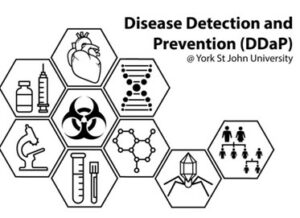‘Five global diseases of burden are explored to reinforce the importance of science and science communication for driving a positive agenda of change’
Dr Adam Odell, Senior Lecturer in Biosciences, and lead for Disease Detection and Prevention (DDaP) Group, discusses science communication and future interdisciplinary projects.

Click here to learn more about Disease Detection and Prevention.
Dr Adam Odell is Senior Lecturer in Biosciences and is the lead for Disease Detection and Prevention (DDaP) at York St John. His research explores the effects that environmental factors, toxins, mutations, and microbes have on human health Odell is currently investigating the correlation between cancers and cardiovascular diseases, and Western obesity, food intake, and inactivity. He hopes that his scientific research can help give autonomy to the public to make informed medical and health choices.
As Odell commences his Disease a Week, as part of the Biomedical Science module ‘Biology of Disease’, he explains how science communication is necessary and effective. In looking at how non-communicable diseases, such as hypertension, are impacted by air pollution, Odell encourages students to think critically about their own environments and social inequality. The module focuses on exploring the impacts of air quality and pollution levels on human health, and how these are entangled into broader issues around ecological justice. As an assessment, Odell is asking students to produce work to ‘inform a fictional government select committee convened around understanding the growing issue of air quality’. He tells me that the Living Lab has made a ‘positive buzz’ of ideas for projects, and through this module he plans to draw on student’s knowledge of important concepts and challenge them to use what they know in new ways. In being a STEM subject, I ask whether social justice issues crop up often. Odell responds that ‘ethical issues around access to healthcare, sociodemographic impact, data protection concerns, and patient involvement in research are often discussed, but this will be the first time the ideas of social justice are specifically addressed with the Biomedical Science degree.’ It will be fascinating to see how students take on new perspectives and apply them into scientific research.
For his Disease a Week, Odell is teaching about five non-communicable diseases (NCDs) using WHO Global Burden of Disease resources. The non-communicable diseases he will be exploring are:
- Cardiovascular disease (includes heart failure, hypertension, ischaemic heart disease, peripheral vascular disease, and stroke)
- Diabetes (type 2 and gestational)
- Respiratory illness (emphysema, chronic obstructive pulmonary disease, and asthma)
- Neurodegeneration (Alzheimer’s disease, dementia, Parkinson’s disease)
- Sepsis (systemic infection leading to exaggerated immune responses).
Odell explains, ‘students will have the opportunity to investigate how air quality, particulate matter, and air pollution levels increase the lifetime risk of developing these diseases. […] Explor[ing] the cellular changes that culminate in organ, system, and organism dysfunction, and crucially whether there is a need to take personal responsibility to try and enact changes in policy direction.’ He goes on to say that these ‘five global diseases of burden are explored to reinforce the importance of science and science communication for driving a positive agenda of change.’
At the beginning of the semester, Odell joined Clare Nattress in analysing the air pollution data she had recorded on bike monitor. He tells me that they ‘have begun looking into whether solubilised air particulates induce any changes in cell growth.’ Odell mentions that ‘there have been some interesting hints that treating blood cells for 5 days with some extracts substantially increases the growth of leukaemia cells.’ He says that this research will continue, saying, ‘it feels like we are just getting started.’ His students will be able to analyse this data, though he does hope students will take the research further and develop it.
Soon, the School of Science will be running interdisciplinary sessions. Odell shows his excitement for a laboratory visit from Dr Morag Galloway’s Music students, where ‘Biomedical Science students attempt to explain how various pieces of equipment within our specialist labs can be used to examine the effects of air quality of cellular health’ and Music students interpret this in their projects. He says he is ‘hoping some other cross-discipline collaborations will also emerge as the weeks progress.’